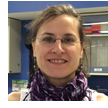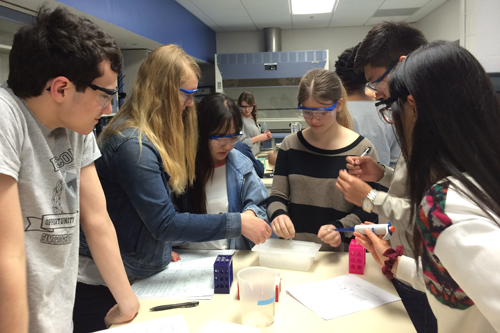Rindge School of Technical Arts Biotechnology Program
From Joan Abrams
 The Biotechnology Program is part of the Rindge School of Technical Arts (RSTA), the technical arm of Cambridge Rindge & Latin School (CRLS). The RSTA Biotechnology Program is Chapter 74 approved and aligned with the Massachusetts Department of Education Career/Vocational Technical Education Framework for biotechnology. It is a three-year course of study designed for students to develop science literacy and proficiency in a broad range of laboratory skills. Students are introduced to fundamental concepts and techniques of cell and molecular biology, genetic engineering, bioinformatics, protein chemistry, and cell culture. In all three levels, there is an emphasis on soft skills important to job and career success including workplace etiquette, teamwork, integrity, flexibility, communication, and leadership. All biotech courses explore prospective careers and work environments through field trips, guest lectures, and independent research. Sound research and presentation skills are emphasized and practiced throughout. The Biotechnology Program is part of the Rindge School of Technical Arts (RSTA), the technical arm of Cambridge Rindge & Latin School (CRLS). The RSTA Biotechnology Program is Chapter 74 approved and aligned with the Massachusetts Department of Education Career/Vocational Technical Education Framework for biotechnology. It is a three-year course of study designed for students to develop science literacy and proficiency in a broad range of laboratory skills. Students are introduced to fundamental concepts and techniques of cell and molecular biology, genetic engineering, bioinformatics, protein chemistry, and cell culture. In all three levels, there is an emphasis on soft skills important to job and career success including workplace etiquette, teamwork, integrity, flexibility, communication, and leadership. All biotech courses explore prospective careers and work environments through field trips, guest lectures, and independent research. Sound research and presentation skills are emphasized and practiced throughout.
Funds from a grant award from the Massachusetts Life Sciences Center (MLSC) in 2012, the Biotechnology Program established a mammalian cell culture facility, enhanced protein purification capability, and upgraded lab equipment and computers. Another MLSC grant in 2015 spawned a collaborative research project with IOMICS Pathways Initative aimed at identifying genetic pathways in yeast, which may be relevant in human genetic diseases. Students enrolled in intermediate- and advanced-level biotech courses can participate in this exciting, real-world research project.
In Biotechnology Level 1, sophomores practice the fundamental skills employed in a research laboratory. Students learn the principles and techniques of recombinant DNA technology and real-life applications with emphasis on commonly used techniques including DNA isolation and analysis, genetic transformation, PCR, spectrophotometry, centrifugation, and gel electrophoresis. Upon mastering the basics, students begin to design and conduct independent laboratory experiments to develop confidence, problem-solving and critical thinking skills.

Science of Food is a laboratory-based, elective science course inspired by Harvard’s Science and Cooking course. It consists of a combination of lectures, labs, guest speakers, and field trips, through which students study chemical and physical principles involved in cooking. Through a collaborative partnership with the RSTA Culinary Program, students explore scientific concepts through edible experiments. They study both traditional methods of food preparation and techniques in molecular gastronomy currently being developed by avant-garde chefs around the world. Students study phase changes through a variety of experiments involving foams, emulsions, gelation, and spherification. They design experiments to study heat transfer, viscosity, and elasticity. A sugar cookie unit culminates in their applying conceptual knowledge to create original nutrient-dense, healthful cookies. Students detect genetically modified foods, isolate and study enzymes from food, and understand the critical role microbiology plays in popular foods.
In Biotechnology Level 2, juniors engage in projects that involve manipulation of recombinant DNA, restriction analysis, PCR analysis, transformation, protein expression and purification, bioinformatics and ELISA. Independent projects throughout the year provide opportunities to investigate individual areas of interest, promote independence, and develop problem-solving abilities.
In Biotechnology Level 3 (Honors), seniors learn fundamental concepts and techniques in protein engineering and analysis. Students use microorganisms to produce proteins and to study protein structure, function, modification and protein engineering. Students are introduced to mammalian cell culture and embark on semester-long research projects relevant in the biotech industry. They explore protein purification methods using a variety of chromatography methods. Journal Club provides the opportunity to develop presentation and communication skills while deepening understanding of emerging scientific issues.
Dr. Joan Abrams has served as Biotechnology Instructor at RSTA since 2004. She completed her doctoral work in Cellular and Molecular Physiology from Tufts University and worked at Genetics Institute and Millennium Pharmaceuticals before transitioning to teaching.
Back to newsletter |